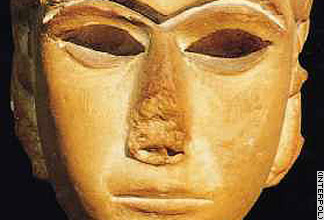31 Dead, 108 Wounded in Hillah Blasts
Basra Insecure
Suicide bombers in the Shiite city of Hillah about an hour's drive south of Baghdad killed at least 31 persons and wounded 108 on Monday. Al-Zaman says one bomber targeted recruits to the Iraqi security forces standing in line for a medical examination. Another hit recently fired security men who had been let go and who were demonstrating because they said they were still owed back pay. It should be remembered that these bombs inevitably kill a lot of civilian by-standers.
On Sunday night, one Iraqi soldier was killed and 4 were wounded in Baiji north of Baghdad in a bombing directed at a joint US/ Iraqi patrol in the west of the city. In the eastern part of the city of Balad, another Iraqi soldier was killed by a mortar strike. Two bodies of drivers were discovered at Sahliyah, who had been kidnapped by guerrillas last week. Guerrillas killed Col. Ahmad Salih al-Barzinji Sunday night after he had been kidnapped in Kirkuk.
In Irbil, guerrillas subjected the South Korean contingent to mortar fire for the first time, but did not appear to hit anything of value. On Sunday, the US military sweep of Hadithah in western Iraq came to an end.
An Iraqi army force detained (al-Zaman says "kidnapped") the Sunni cleric Shaikh Nawfal Kadhim al-Juburi, the prayer leader at the al-Salam mosque in Nahrawan in southeast Baghdad along with 35 worshippers in a dawn raid on the mosque. The raid was forcefully condemned by the Sunni Pious Endowments Board.
Al-Hayat Muhsin Abdul Hamid, a former president of Iraq under the American Coalition Provisional Authority and the leader of the Iraqi Islamic Party who was mistakenly arrested by the US military and then released, said late Monday that he considered the arrest to have been "deliberate." Party spokesmen said that the arrest was a piece of American "stupidity" aimed at alienating the Sunni Arabs from political participation. Meanwhile, the other major religious group among the Sunnis, the Association of Muslim Scholars, condemned the arrest as proof that the elected Iraqi government "is not sovereign over the country" and said that Abdul Hamid's detention "underlined the power of the Occupier." They added, "no Iraqi is safe under the shadow of presence" of the occupying forces. An AMS spokesman said that the government's acceptance of this situation had multiplied the opportunities for the occupiers to intervene in Iraqi affairs. The AMS called for a united Iraqi front that would stop the occupying forces in their tracks. Adnan al-Dulaimi, another Sunni spokesman, said that there is a hidden hand plotting to marginalize the Sunni Arabs.
Abdul Hamid said he still did not know why he had been taken into custody along with his sons. He said, "American troops invaded my home at 4 am. They handcuffed me and led me to an unknown place, then transported me by helicopter to yet another location, where I was interrogated all day long about various matters." The US military apologized to Abdul Hamid for the inconvenience.
Abdul Aziz al-Hakim, leader of the victorious United Iraqi Alliance list that dominates parliament, complained recently that the guerrillas blowing up things in Iraq are just prolonging the US military presence in Iraq. He also complained that the US is stopping Iraq from buying heavy weaponry (I had been wondering where the new Iraqi tank corps was. There is a small one, but it is rudimentary). I conclude that al-Hakim is eager to get rid of the Americans, and feels frustrated that he cannot proceed with it until the Sunni Arab rejectionists stop their war and until he can find a way to get tanks and heavy artillery for his own forces so as to reduce dependence on the US.
Al-Hakim also leads the Supreme Council for Islamic Revolution in Iraq (SCIRI), which was formed in 1982 in Tehran under the sponsorship of Ayatollah Khomeini and which had its HQ in Iran until 2003. It is therefore no surprise that Iran and Iraq are now moving steadily toward better and better relations, including plans for a rail link from Khorramshahr to Basra and another from Kermanshah to Diyalah province. Iran and Iraq will do a billion dollars worth of trade this year, but the number is likely to mushroom in coming years, especially if the security situation allows Shiite pilgrims to come to Najaf and Karbala. Iran expects trade barriers to be removed, and has expressed willingness to sell Iraq electricity.
Rory Carroll of the Guardian reports from Basra on the views of its police chief, who had been appointed by Iyad Allawi:
General Hassan al-Sade said half of his 13,750-strong force was secretly working for political parties in Iraq's second city and that some officers were involved in ambushes. Other officers were politically neutral but had no interest in policing and did not follow his orders, he told the Guardian. "I trust 25% of my force, no more." The claim jarred with Basra's reputation as an oasis of stability and security and underlined the burgeoning influence of Shia militias in southern Iraq. "The militias are the real power in Basra and they are made up of criminals and bad people," said the general.
It gradually becomes apparent, though, that al-Sade's jaundiced view of the situation in Basra is that of an ex-Baathist nervous about the rising influence of the Sadrists and the Supreme Council for Islamic Revolution in Iraq, who are replacing Allawi's ex-Baathists with their own men in the police force.
Carroll would have done his readers a favor to have mentioned who won the provincial elections in Basra on January 30. Of 41 seats, 20 went to the Shiite Islamists of the Supreme Council for Islamic Revolution in Iraq (SCIRI). Another 16 or so went to the Virtue Party or Fadilah, which follows the late ayatollah Muhammad Sadiq al-Sadr. Carroll, it seems to me, is likely confusing Fadilah with the followers of Muqtada al-Sadr. In fact, they follow Muhammad al-Yaqubi, a more low-key rival of Muqtada's who studied with Muqtada's father. Fadilah controls Basra city hall because it put together a coalition that gave it 21 seats, so it can outvote SCIRI. The two victors of the democratic elections, in any case, are now appointing the police, which are obviously loyal to the parties rather than to an ex-Baathist police chief installed by the widely disliked ex-Baathist and old time CIA asset Iyad Allawi.
Ash-Sharq al-Awsat reports Tuesday that the Ministry of Interior has established a fifth branch of its special forces, called the Panther Brigade, in Basra. The ministry is now controlled by the Supreme Council for Islamic Revolution in Iraq, and some Sunni leaders have claimed that its special forces are tools of Shiite dominance over Sunnis. Al-Sade may also worry about being outflanked by this Federal force, which has a special charge of fighting terrorism and protecting Federal property.
So I come away not knowing if al-Sade is accurately reporting a crime problem in Basra or is just expressing the sour grapes of an ex-Baathist whose prime minister lost the election in a crushing defeat, and who seems a little unlikely to survive in his post because of the current Iraqi spoils system.
"Yoshihiko Motoyama: Lawless private militaries milking Iraq conflict" explains the private paramilitaries operating in Iraq.
Now the senior Iraqi physicians are fleeing the country. More good news.
This article on unmanned aerial vehicles or UAV's and their military usefulness in Iraq begs the question of why, if they are so great, there are still all those bombings.
Reuters profiles the neighborhood watch program in the northern Kurdish city of Sulaimaniyah. It is a great idea and has had some success there, but it probably cannot be done in the Sunni Arab areas where it is most needed, for two reasons. 1) People are too afraid and intimidated to call in, for fear of reprisals and 2) a large number of people approve of the Iraqi guerrillas, to whom they refer as the "resistance."
For "cont'd" postings, click here.
|
|
 |  |  |
|---|
| Email to a Friend: | |
|---|



 |
|
 Facebook
Facebook




